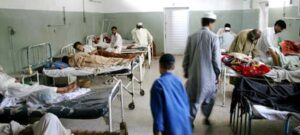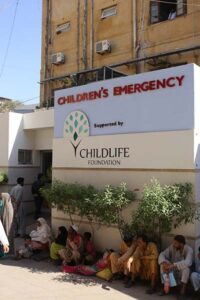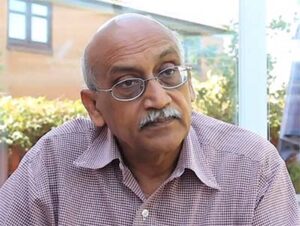In 1941, the city of Karachi had a population of 4,35,887 persons. It boasted a developed, organised and efficient municipal corporation that took care of water supply, sewerage and garbage disposal. There was a powerful district health officer (DHO) in place, and a team of health inspectors, who were responsible for maintaining a healthy environment in the city by controlling industrial pollution and maintaining proper statistics on death and disease to confront any health-related challenges in emergency situations.
The amenities in the slums of Karachi were not at par with those in the downtown, posh areas inhabited by Parsis and Christians, and the elite Muslim colonies. However, the municipal corporation did have a team that swept the city’s poor localities every day, and even in congested bazars like Lea Market, Soldier Bazar and Empress Markets that sold meat fish, vegetables and other food items, a reasonable standard of cleanliness was maintained.

The city had one referral hospital, the Civil Hospital, where doctors were on duty round-the-clock and emergency services were available for needy patients. Additionally, multiple medical dispensaries, including Shifa Khanas run by qualified Hakeems, functioned on a daily basis and patients from here were often referred to Civil Hospital for further treatment. One of those dispensaries still exists near Jehangir Park, as does a Shifa Khana behind Bolton Market, near the Edhi residence.
The city had, at least, eight well-run maternity homes, including the Sobhraj (Kishan Devi Chetumul) Maternity Home, Lady Dufferin Hospital and the Aga Khan Maternity Home, that provided basic and emergency healthcare to women in need.
The city also had a big centre for the treatment of skin diseases such as leprosy, and a huge complex called Ojha Sanatorium for patients suffering from tuberculosis. The Parsi community had their own hospital, the Parsi General Hospital in Saddar, which is still operational.
These facilities were sufficient to meet the demands of a small population of less than half-a-million people compared to the present healthcare network in Karachi, which is woefully inadequate to cater to a population of more than 20 million people. In fact, Karachi does not have an organised healthcare system for its poor, neither does it have a sufficient number of private hospitals to cater to the well-heeled.
A majority of Karachi’s hospitals do not have access to clean potable water, and neither do they bother to set up a proper sewerage and garbage disposal system where they can dump the hospital waste. Consequently, a great number of people get infected and suffer from typhoid, cholera, dengue fever, tetanus, malaria, food-poisoning and other virus-related epidemics, leading to death and morbidity. Additionally, health authorities have failed to deal with the challenge of gutka (a chewable combination of betel nuts and tobacco), which is responsible for hundreds of untimely deaths of young people.
Unfortunately, the city government and the provincial government have no system to monitor pollution, which is causing chronic infection of the upper respiratory tract in people — a leading cause of death. Asthma is also on the rise in children and adults, because of the growing concentration of smoke emitted by factories in the industrial areas.
Once upon a time, the city used to have an organised mechanism for transporting meat from the animal slaughter house in Landhi to meat shops in the city. That has ceased to exist. The existing slaughter house and the fish wholesale market are extremely filthy and pose a health hazard. One would probably stop eating meat and fish if one were to visit these two places.
Given the pathetic hygiene standards in the city, it is not surprising that Karachi has a very high maternal and neonatal mortality rate. Out of the 26 maternity homes run by the city government, only two maternity homes are functional on a 24-hour basis. The departments of Obstetrics and Gynaecology at the Civil Hospital (CHK), Jinnah Post-graduate Medical Centre (JPMC), the Abbasi Shaheed Hospital (ASH) and the Qatar Hospital are perennially overcrowded. And despite the existence of a few charity hospitals for women, the number of maternal deaths is exceptionally high in Karachi.
The National Institute of Child Health (NICH), the National Institute of Cardio-vascular Diseases (NICVD) and the Sindh Institute of Urology and Transplantation (SIUT) in the government sector are providing very good services but these are not enough to cater to the increasing number of patients arriving daily from interior Sindh.
Kiran, a federally-funded cancer hospital, is providing free medical services to cancer patients, but it is overcrowded, short of funds and unable to cope with the rising number patients on a daily basis. It is constantly in need of donations.
The other government hospitals run by the provincial health department and the Ministry of Local Bodies are not functioning to their full capacity because of lack of interest from the administration and wide-scale corruption and misuse of funds.
The JPMC, the CHK and the ASH are general hospitals attached to medical colleges and are part-time hospitals with part-time faculty members, a majority of whom run their own full-time private practices and hence have only a fleeting interest in teaching and training under-graduate and post-graduate medical students. The government has failed to develop a system, whereby the services of these experts are utilised for proper treatment of patients and production of good human resources for the future.
There are other medical units that are supposed to provide healthcare but the quality of their services leaves a lot to be desired. The two social security hospitals in the Landhi and SITE areas are also part-time hospitals attached to private medical colleges. The Pakistan Steel Mill Hospital and the Railway Hospital are not functional; the Police Hospital is functioning but it faces an acute shortage of resources.

Private hospitals, on the other hand, appear to be fleecing their patients. And their services are not commensurate with the exorbitant fees they charge. Interestingly, most of these big private hospitals have opened up medical colleges as well, purely with the intent of minting more money. The quality of medical education they impart is mostly not at par with international standards.
Like private hospitals, the army and navy hospitals have also set up medical colleges in Karachi with the prime purpose of making money in the name of medical education. However, the limited number of medium-sized hospitals that they run are offering reasonably efficient services to needy patients, but they are able to serve only a few pockets of the population.
Then there are a large number of small-sized private hospitals that are providing inferior quality medical services and are no better than quacks. They are taking advantage of a non-existent medico-legal framework. By a rough estimate, there are more than a hundred thousand quacks — homeopathic doctors, hakeems, dais, and the religious healers present at assorted shrines — who are active in the community “treating” infertility, impotence, skin diseases, haemorrhoids, diabetes, different types of cancers and psychiatric disorders.
All in all, the overall situation of healthcare in the city of Karachi is deplorable and patients are suffering as a consequence. There is a pressing need for health reforms in government hospitals and medical colleges. All hospitals should be made functional 24/7 and all faculty members must be employed full-time, with good salaries and benefits. Moreover, there is a need to regularise private medical education by a professional regulatory body, and not organisations like the health commission.
Additionally, all maternity homes and peripheral hospitals of Karachi should be made operational and subject to good governance. There should be stringent health and safety protocols and such medical units must be regularly monitored.
There should be extra emphasis on proper training of nurses, midwives, paramedics and special technicians to run all medical units effectively.
At the end of the day, Karachi’s healthcare system will not improve without the political will of the government and the desire of medical professionals to raise the quality of healthcare and the professional standards of medical education.

The writer, a leading doctor, is former Secretary-General of the Pakistan Medical Association.



Wellness is a favorable concept highlighting social and personal resources, in addition to physical fitness. This means that health is a resource to sustain a person’s function in bigger society, instead of an end in itself. A healthful lifestyle provides the means to lead a complete life with definition as well as objective. We must consider our life important as it is God gifted. Well written content need more content in future. 🙂